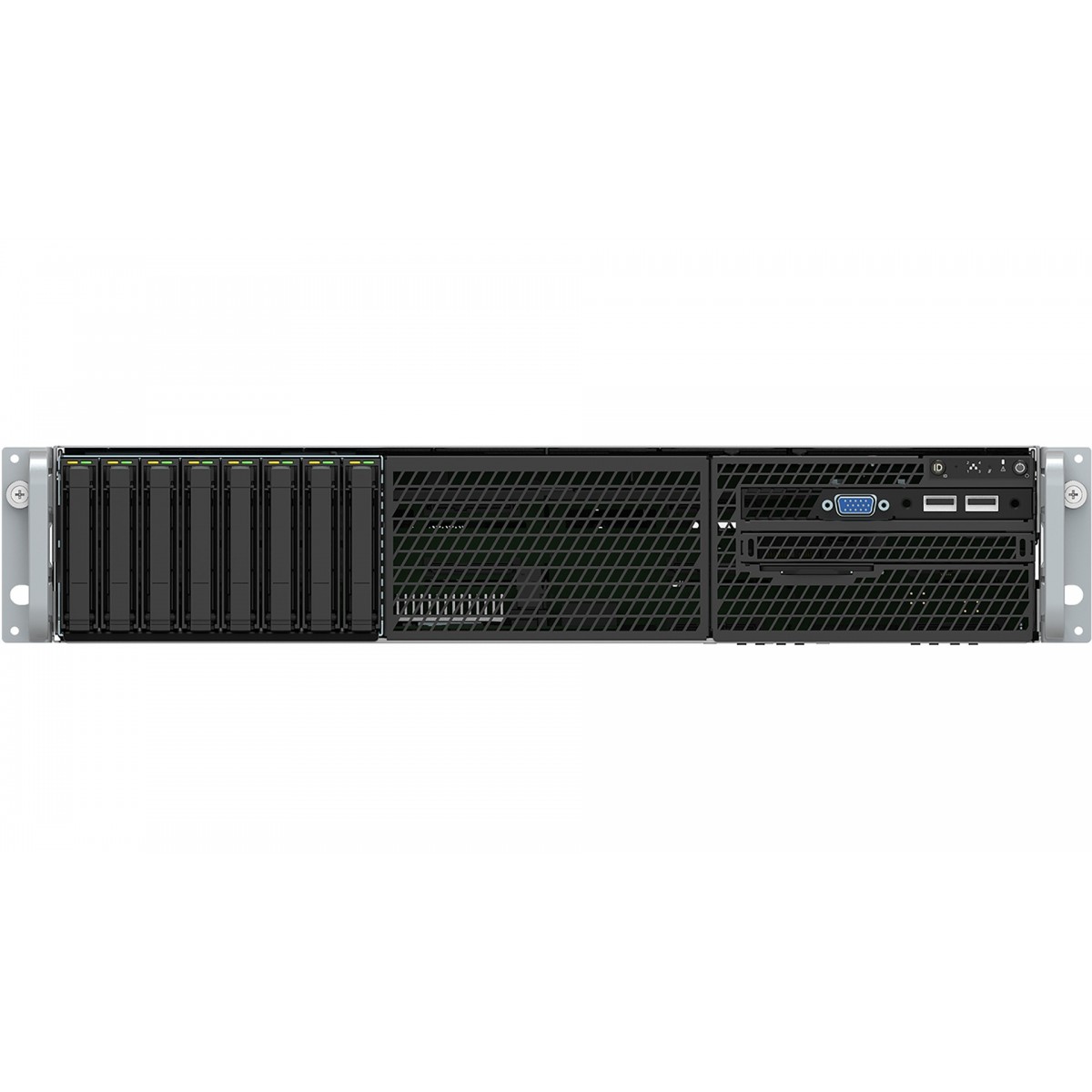Intel Server System R2208WFTZSR - Server Barebone - Intel Socket 3647 (Xeon Phi)
P/N: R2208WFTZSR
Producent:
Intel
Czas dostawy: ok. 4-5 dni
7 996,87 zł netto
Server System R2208WFTZSR - Server Barebone - Intel Socket P/478 (Core 2 Duo)
|
|
||||
| Intel R2208WFTZSR, Intel® C624, LGA 3647 (Socket P), DDR4-SDRAM, 7500 GB, 2.5,M.2, SSD |

|
|||
| Server System R2208WFTZSR - Single | ||||
| Group | Servers | |||
| Manufacturer | Intel | |||
| Manufacturer item no. | R2208WFTZSR | |||
| EAN/UPC | 5032037151108 | |||
| Description | ||||
|
Intel® Virtualization Technology for Directed I/O (VT-d)
Intel® Virtualization Technology for Directed I/O (VT-d) continues from the existing support for IA-32 (VT-x) and Itanium® processor (VT-i) virtualization adding new support for I/O-device virtualization. Intel VT-d can help end users improve security and reliability of the systems and also improve performance of I/O devices in virtualized environments. TPM Version TPM (Trusted Platform Module) is a component that provides hardware level security upon system boot-up via stored security keys, passwords, encryption and hash functions. Integrated BMC with IPMI IPMI (Intelligent Platform Management Interface) is a standardized interface used for out-of-band management of computer systems. The integrated BMC (Baseboard Management Controller) is a specialized microcontroller that enables IPMI. PCIe x4 Gen 3 PCIe (Peripheral Component Interconnect Express) is a high speed serial computer expansion bus standard for attaching hardware devices to a computer. This field indicates the number of PCIe sockets for the given lane configuration (x8, x16) and PCIe generation (1.x, 2.x). Integrated Graphics Integrated graphics allow for incredible visual quality, faster graphic performance and flexible display options without the need for a separate graphics card. Intel® Optane™ Memory Supported Intel® Optane™ memory is a revolutionary new class of non-volatile memory that sits in between system memory and storage to accelerate system performance and responsiveness. When combined with the Intel® Rapid Storage Technology Driver, it seamlessly manages multiple tiers of storage while presenting one virtual drive to the OS, ensuring that data frequently used resides on the fastest tier of storage. Intel® Optane™ memory requires specific hardware and software configuration. RAID Configuration RAID (Redundant Array of Independent Disks) is a storage technology that combines multiple disk drive components into a single logical unit, and distributes data across the array defined by RAID levels, indicative of the level of redundancy and performance required. Intel® Remote Management Module Support The Intel® Remote Management Module (Intel® RMM) allows you to securely gain access and control servers and other devices from any machine on the network. Remote access includes remote management capability, including power control, KVM, and media redirection, with a dedicated management network interface card (NIC). Connector for Intel® Integrated RAID Module Internal IO expansion module indicates a mezzanine connector on Intel® Server Boards that supports a variety of Intel(r) I/O Expansion Modules using a x8 PCI Express* interface. These modules are either RoC (RAID-on-Chip) or SAS (Serial Attached SCSI) modules that are not used for external connectivity through the rear I/O panel. PCIe OCuLink Connectors (NVMe support) Onboard PCIe OCuLink connectors provide direct-attach NVMe SSD support. Intel® Rapid Storage Technology enterprise Intel ® Rapid Storage Technology enterprise (Intel ® RSTe) provides performance and reliability for supported systems equipped with Serial ATA (SATA) devices, Serial Attached SCSI (SAS) devices, and/or solid state drives (SSDs) to enable an optimal enterprise storage solution. # of UPI Links Intel® Ultra Path Interconnect (UPI) links are a high speed, point-to-point interconnect bus between the processors, delivering increased bandwidth and performance over Intel® QPI. Intel® Node Manager Intel® Intelligent Power Node Manager is a platform resident technology that enforces power and thermal policies for the platform. It enables data center power and thermal management by exposing an external interface to management software through which platform policies can be specified. It also enables specific data center power management usage models such as power limiting. Intel® Optane™ Persistent Memory Supported Intel® Optane™ persistent memory is a revolutionary tier of non-volatile memory that sits between memory and storage to provide large, affordable memory capacity that is comparable to DRAM performance. Delivering large system-level memory capacity when combined with traditional DRAM, Intel Optane persistent memory is helping transform critical memory constrained workloads – from cloud, databases, in-memory analytics, virtualization, and content delivery networks. |
||||
| Main features | ||||
| General | ||||
| Motherboard chipset | Intel® C624 | |||
| Processor socket | LGA 3647 (Socket P) | |||
| Supported memory types | DDR4-SDRAM | |||
| Maximum internal memory | 7500 GB | |||
| Storage drive sizes supported | 2.5,M.2 " | |||
| Supported storage drive types | SSD | |||
| SSD form factor | M.2 | |||
| Ethernet interface type | 10 Gigabit Ethernet, Gigabit Ethernet | |||
| Ethernet LAN | Y | |||
| Ethernet LAN data rates | 10,100,1000,10000 Mbit/s | |||
| Export Control Classification Number (ECCN) | 5A992C | |||
| Commodity Classification Automated Tracking System (CCATS) | G157815L2 | |||
| Compatible operating systems | Windows Server 2016*|Ubuntu* | |||
Opis
- Type
- Server Barebone

 Panel
Panel



